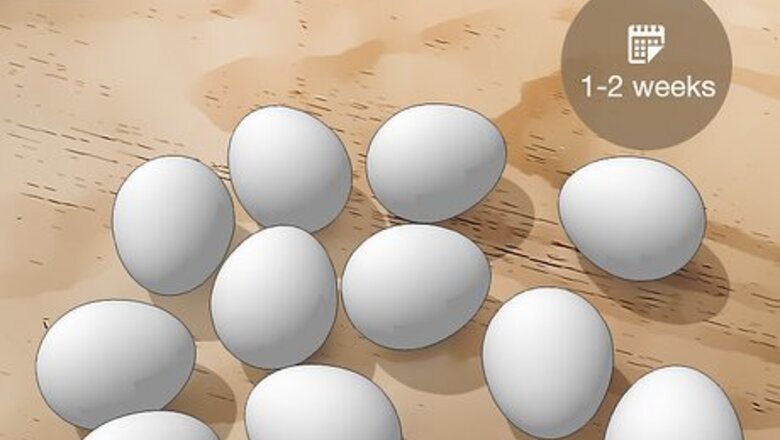
views
Boiling Eggs

Choose eggs that have been in the fridge for 1-2 weeks. Super fresh eggs are full of moisture and that makes them harder to peel. As the eggs get older, they lose a little bit of moisture through their shells, creating a bigger pocket of air at the top. This pocket of air will make the peeling process a bit easier. How easy the eggs are to peel doesn’t have much to do with whether or not they’ll smell, but it does make life easier when you’re ready to eat!
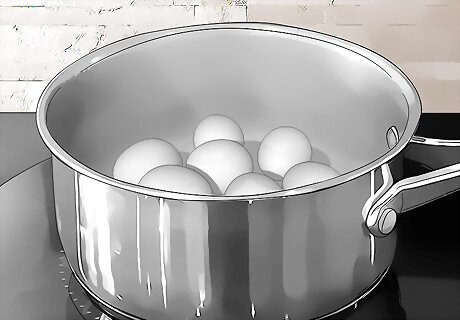
Place the eggs in a single layer at the bottom of an empty pot. The eggs shouldn’t be stacked on top of each other. If you have too many eggs to cook at once, work in batches or switch to a bigger pot. Ideally, you want enough space for water to surround each egg on every side. Keeping the eggs in a single layer will help them cook more evenly. If they’re too crowded, you might get some eggs that are overcooked and others than are undercooked.
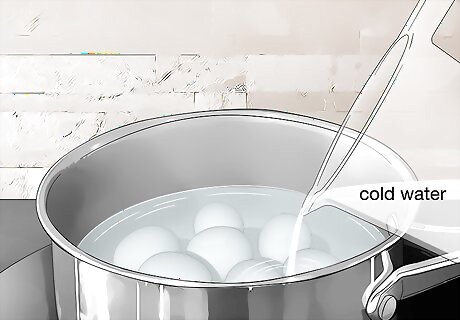
Add cold water to the pot until the eggs are covered by 1 inch (25 mm). Don’t use warm, hot, or boiling water. To get the best results, start with cold water that you’ll then bring to a boil. You don’t need to fill the pot with water, either. Just enough to cover the eggs from top to bottom is perfect. Some experts say that you should boil the water first before putting in the eggs, while others claim that the cold-water method is the best. If you’re curious, try it both ways and see which way you prefer! Using the right amount of water is an important part of cooking the eggs right. If there is too much water, it’ll take longer to come to a boil, meaning that the eggs will cook for a lot longer than they need to. Overcooked eggs are more likely to give off a sulfurous scent.
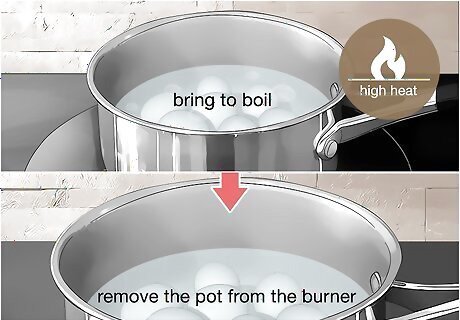
Bring the water to a boil, then remove the pot from the burner. Use high heat and keep a close eye on the pot during this stage. While you want the water to boil, you don’t want the eggs to stand in the boiling water for too long. The sulfurous smell comes from eggs that get overcooked during this process. Eggs that are cooked for too long or at too high a temperature will develop a green ring around the yolk. This ring causes that eggy smell.
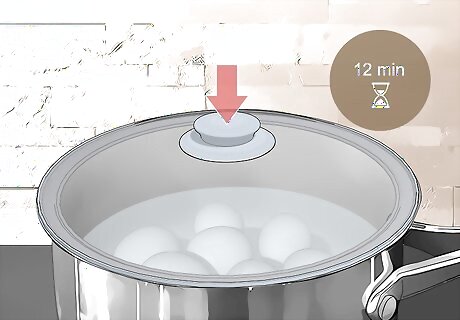
Put the lid on the pan and leave the eggs alone for 12 minutes. Make sure the pot is set somewhere safe where it won’t get knocked over. Set a timer for the 12 minutes—it’s really important that you don’t overcook the eggs if you want to keep them from smelling when you pack your lunch. The 12-minute cook time is assuming that you’re working with large eggs—if they’re a different size you’ll need to adjust the cook-time: Cook extra-large eggs for 15 minutes. Cook medium-sized eggs for 9 minutes.
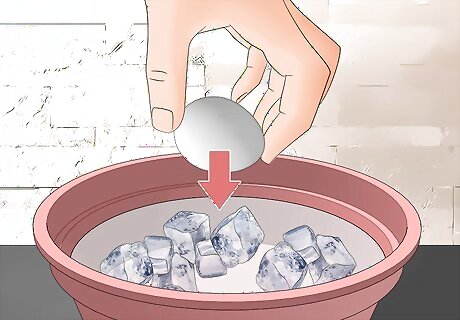
Finish by dunking the eggs in an ice bath. Once the timer goes off, you have to stop the eggs from continuing to cook. The best way to do this is to submerge them into a bowl filled with cold water and several ice cubes for 1-2 minutes. Stopping the eggs from continuing to cook is really important to prevent them from smelling. Because they’re so hot, they would continue to cook even after removed from the pot. Cold water stops the cooking process entirely.Warning: Be careful when removing the eggs from the pot. Use a slotted spoon or ladle so that you don’t accidentally burn yourself.
Storing and Packing Eggs
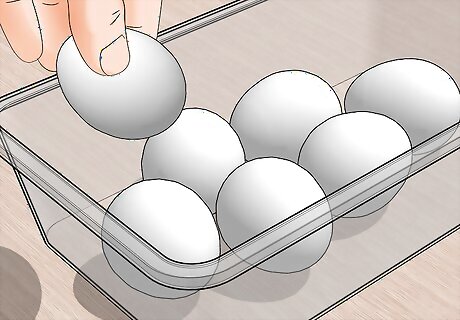
Leave hardboiled eggs in their shells until you’re ready to eat them. This should hopefully help contain some of that egg-smell that hardboiled eggs are so well known for. Even with a perfectly cooked egg, there will still be a slight odor, but hopefully none of the heavy-sulfur fumes that you’re trying to avoid. If you do peel your eggs ahead of time, keep them in a bowl of cold water in the fridge. Just remember to change out the water daily.
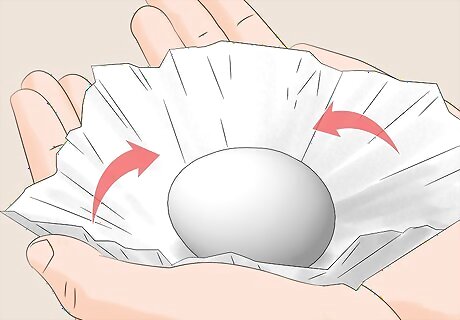
Wrap the boiled egg in a cloth napkin to keep it from cracking. An accidental crack could make your lunchbox smell more like eggs when you finally open it. Simply wrap the egg in a clean cloth, which can then double as your lunch napkin! If you’re on-the-go, you may not have access to a trashcan when you finish eating. At the end of your meal, you could always wrap the discarded eggshell in the napkin so it doesn’t get all over your lunchbox.
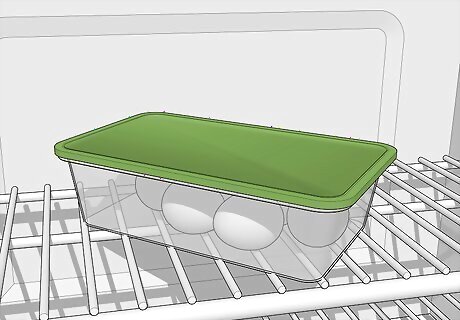
Keep your lunchbox in the fridge until it’s time for you to eat. This may not always be possible, but the best way to keep your eggs safe and to prevent that weird eggy smell is to keep them cold. After you pack your lunchbox, stick it back into the fridge until you have to leave home. When you get to work or school, find out if there is a fridge you can use to store your lunchbox. If there are other parts of your lunch that you don’t want to get too cold, put the eggs in a resealable plastic container or baggie. This way, you can move them in and out of the fridge separate from the rest of your lunchbox.
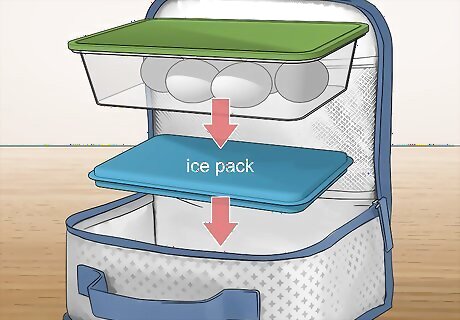
Use an icepack if you won’t be able to put your lunch box in the fridge. This is especially important if your lunchbox will be at room temperature for more than 2 hours before you can eat. The icepack will keep the egg (and the rest of your food) safe, and it should help prevent it from smelling too strongly. Hardboiled eggs shouldn’t be left at room temperature for more than 2 hours.


















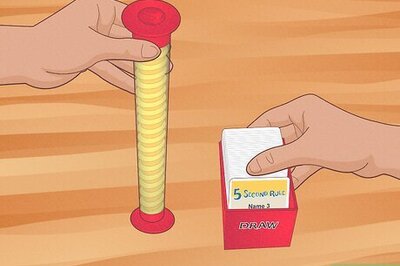
Comments
0 comment